Making amateur games no one wants. For free. For fun.
About 30 titles get released on Steam daily (used to be half of that in 2017), most of them developed by indie authors. Unless a game is made by a team of skilled professionals, and its marketing budget at least equals the development budget and amounts to thousands, if not tens of thousands of dollars, it's destined to be ignored and eventually forgotten by all. That's a sad truth of life. Still, there are some exceptions to this rule, and so, thousands of indie developers keep pursuing their dreams. They say, if you want to be successful, you should hire experienced coders and artists, work your ass off, and don't forget about marketing, which is probably the most important part. That makes great sense, but doesn't sound like fun to me at all.
The reason why I started making games was to have fun and improve my writing skills. If I have to abandon all hopes of success because I don't have a budget or don't want to turn my hobby into work, so be it. I don't mind.
Does realizing that you're about to spend another year of your life on something no one wants, needs, or even is going to try for free sound discouraging? To me, it doesn't. I consider it a blank check that grants you unlimited freedom of action. I know my visual novels can't be marketed because the target audience doesn't exist, and I don't give a rat's ass about that because I can afford to make games I like without having to compromise.
And so, I released my first visual novel in 2021, when I got stuck in Thailand due to the pandemic. It was anything but successful, although I've got some pretty good reviews on Steam (94% positive). One of the reviewers said they couldn't believe it hadn't blown up yet. Well, that's because of what I told you: nothing blows up on its own, especially if it's a visual novel. You need to cough up some cash first.
So, it was pretty surprising to see some YouTube guys making full walkthroughs of my visual novel, which took most of them about 20 videos. They enjoyed it, and it was enough for me to keep going. It meant the game was good, right? What else is there to desire? The next year, I came up with another fancy idea.
Plot basis
Thailand is a country steeped in culture and tradition. In the everyday life of ordinary people, superstition, magic, and even sacrifices coexist peacefully with progress and high-tech. It's not unusual for a modern Thai person to bring a truckload of oranges to a temple as an offering to an Indian deity and hit the jackpot in the lottery. I'm not kidding; it was in the news.
For most people, Thailand remains a third-world tourist destination, famous for its beaches. The dark side — dangerous beliefs, dark rituals, folk tales, and urban legends — is hardly known to the general public. I think it's sad, given how distinctive and, dare I say it, creepy the Thai culture is.
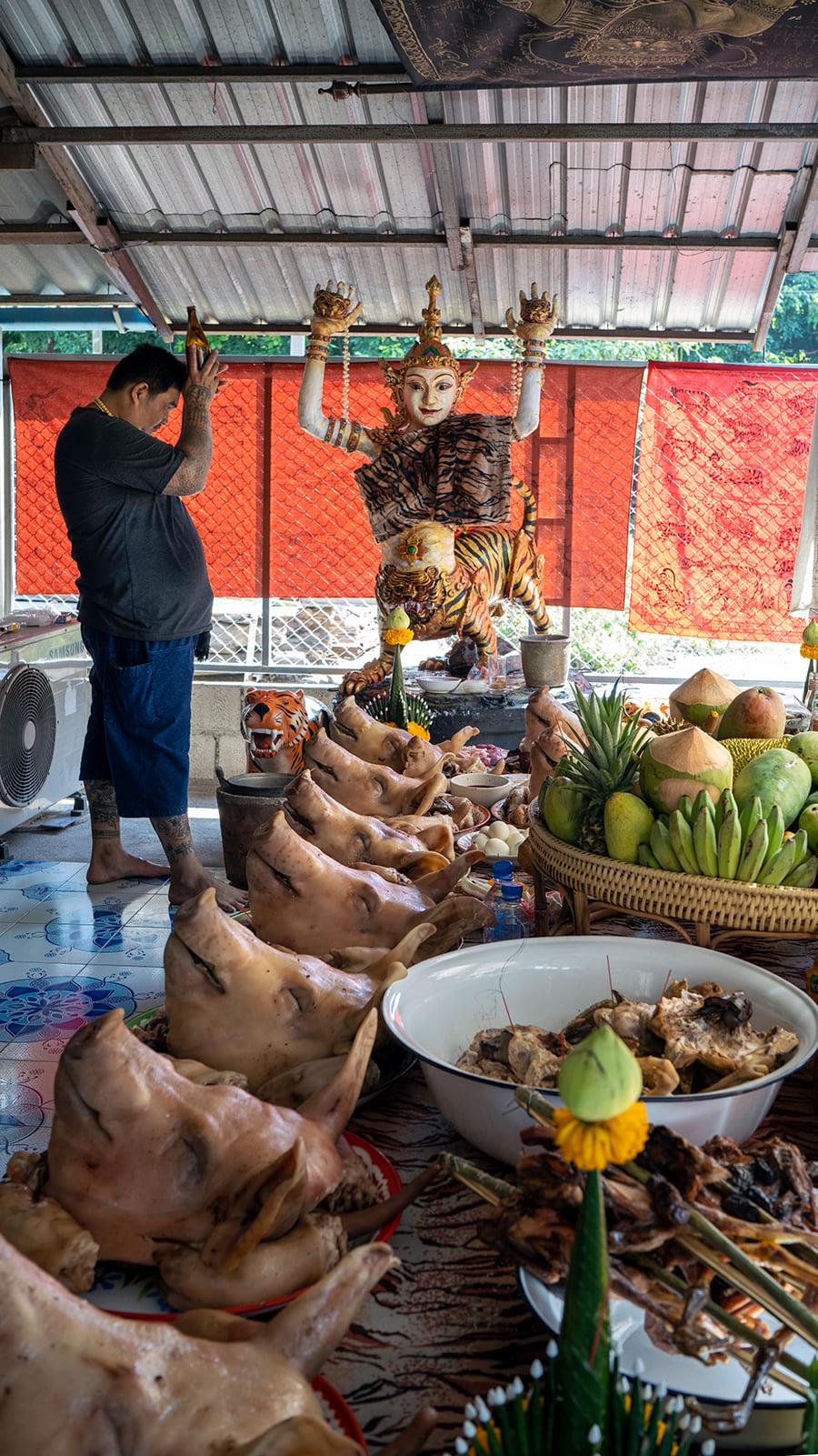
My visual novel, No Men in This House, is based on the myth of the widow ghost (phi maemai in Thai). According to the legend, if a widowed woman dies a painful death, she becomes an evil spirit obsessed with finding a new husband. At night, the ghost prowls the village, and if it sneaks into a house where a man lives, he will be found dead in his bed the next morning.
Like many folk tales, the phi maemai story has a real-life foundation. For the inhabitants of northeastern Thailand villages, it's not an abstract horror story but a real threat. Every year men die one after another for no particular reason. This information is confirmed by the Thai media. The official explanation is that SUNDS, a genetically conditioned disease characteristic of Southeast Asian populations, is the cause of the mysterious deaths. However, villagers tend to blame the widow's ghost.
It's believed that a red T-shirt hung on a house or a fence can scare away the evil apparition. Some villagers also use signs that read, "No men in this house," to trick phi maemai and make her avoid the dwelling.
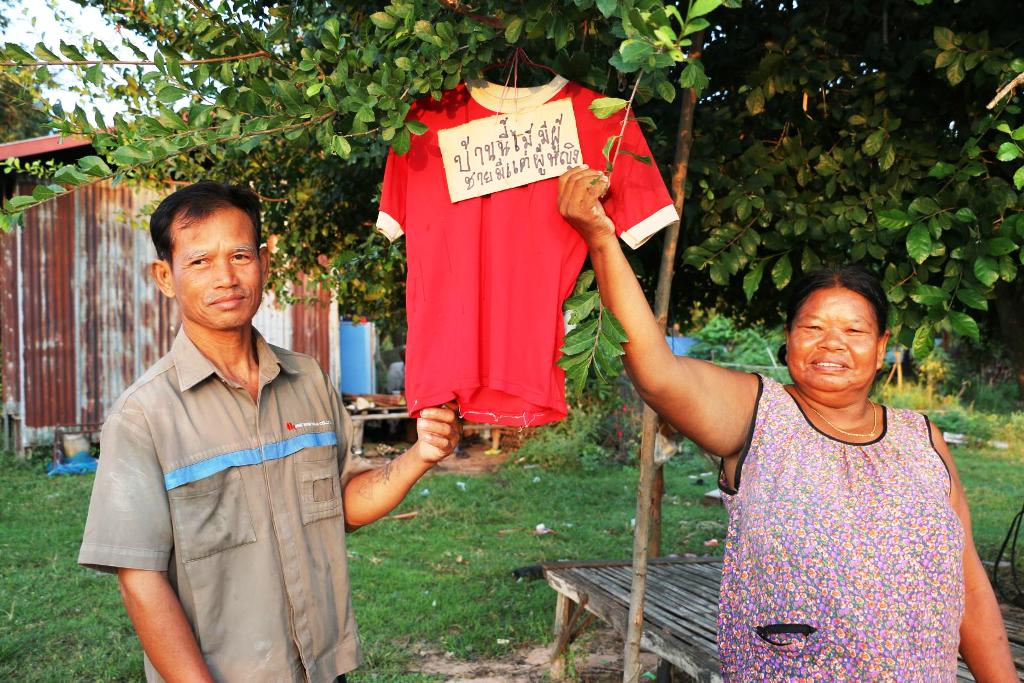
This legend is the basis of the novel's plot: Russian-speaking tourists and expats stranded on the island amid the pandemic are confronted with the gruesome underside of an alien Eastern culture when men begin to die in the village they live in.
The development
Like my previous visual novel, No Men in This House was developed with zero budget unless you count a paid Grammarly subscription I bought to edit the English version, and the Steam Direct fee. I did most of the work on my own, too. Of course, apart from me as the author, there was a composer and actors who played the characters, but all the decisions concerning the visual design, the plot and its realization were made by me alone.
Solo development allows you to focus on the process entirely because you don't have to deal with your team members. Therefore, the novel was not only written but also translated into English in only ten months. It takes 5-6 hours for the reader to finish it.
Koh Samui — a famous touristy island — was chosen as the place of action. To get there, I had to move from Phuket, and then I had to change my place of residence several times in search of a perfect location. Finally, a lovely resort hotel with a swimming pool was found, where the plot was supposed to be unfolding.

Characters:
The actors who played the characters were scattered around the world. One character was photographed in Mexico, three others in Colombia, two in Thailand, and two more in Russia.
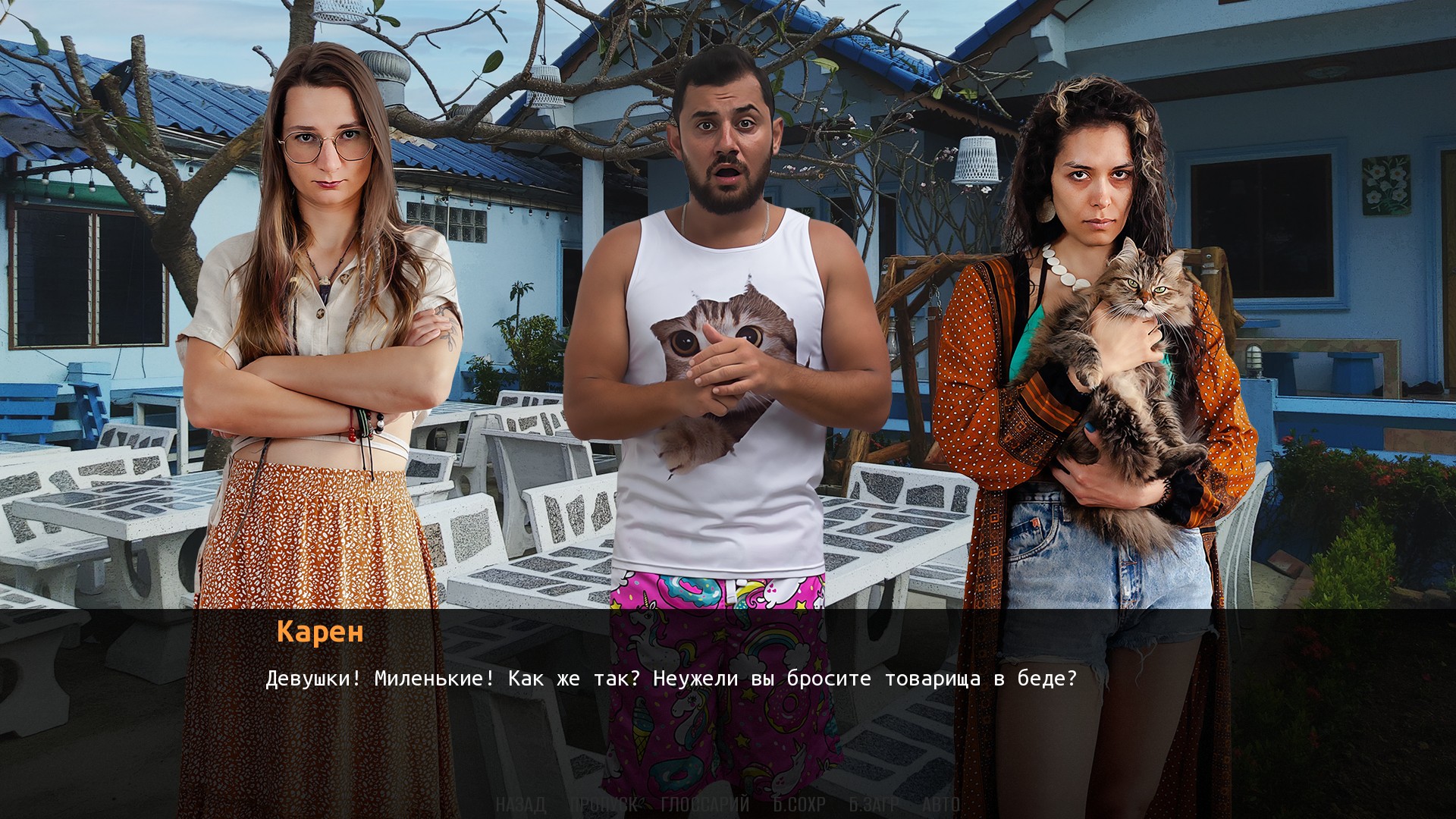
I'd like to say a few words about the girl with the cat in her arms and the video blogger. In the previous visual novel, some of the events were presented with the help of a TV news program host, who wasn't really a distinctive character and only served as a plot device. The news, by the way, was completely real, even the stories where a spider helps win the lottery or a snake bites a woman on the bottom while she's on the toilet. Now, I've decided to abolish both the anchor and the TV station. This time, the news is read by a certain "notorious" video blogger — the only one of the characters who exists in reality, by the way.
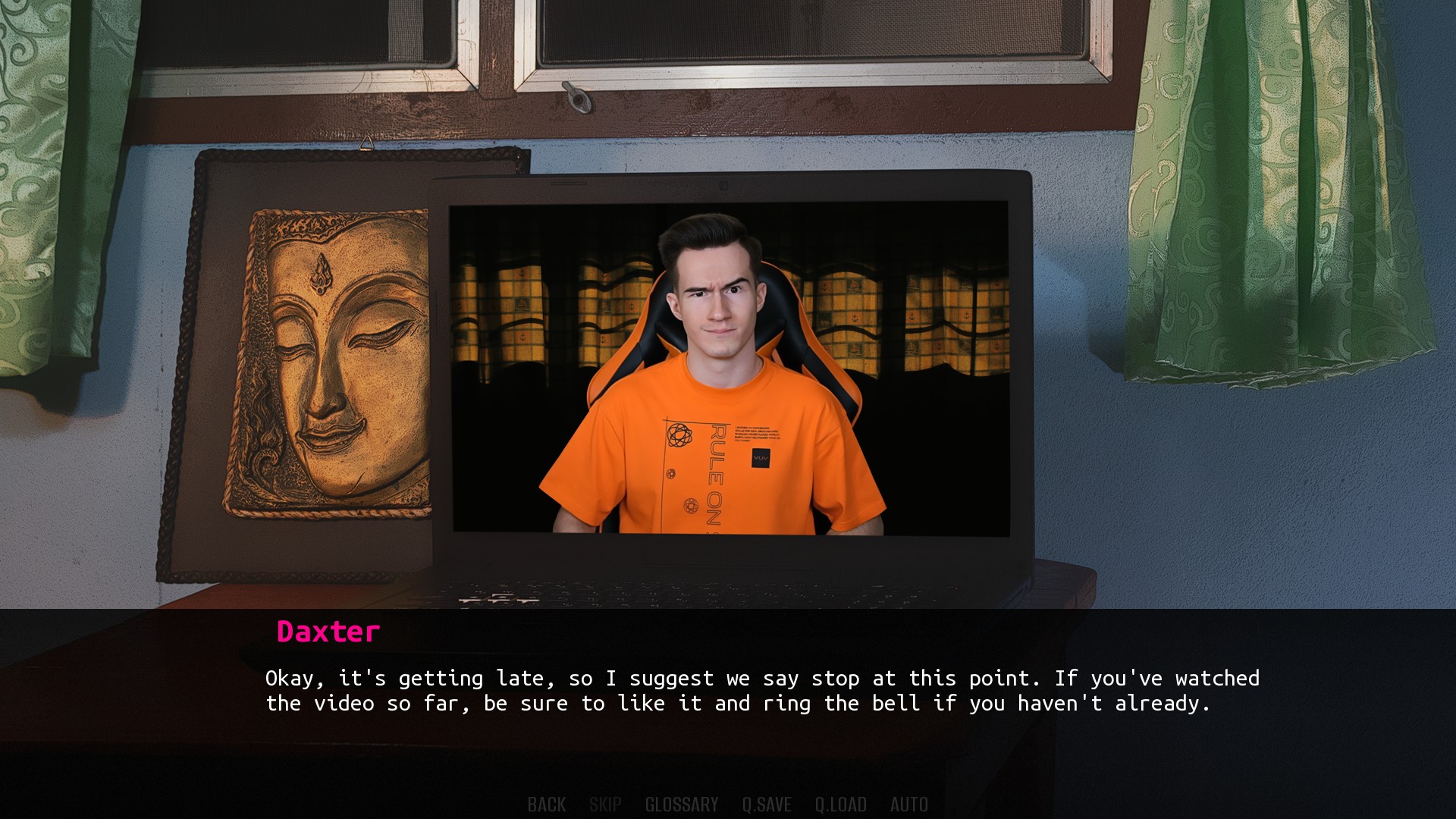
Daxter is a YouTube letsplayer. When my first visual novel, "Shut Your Teeth," was released, he made a series of videos in which he read it out loud. It gave me the idea to turn him into a character in my next visual novel.
Music:
The soundtrack plays an important role: the music not only accompanies the scenes and creates the mood but also serves as a means of conveying symbols not directly related to the story. In the prologue, the news host talks about the funeral of a rooster. At the same time, the player can hear a cover of the Swedish folk song "Vår tupp är död", which literally means "The rooster's dead." It's not a reference to the song itself but rather to the Kokodi Kokoda movie, which hints that things won't be as fun as they seem at the beginning of the novel.
During the development stage, I was obsessed with Richard Wagner's opera Das Rheingold, which I've listened to more than 50 times. Not surprisingly, it seeped into both the plot and the soundtrack. The novel juxtaposes the Nibelungen, dwarves from the underworld, with the so-called "down-shifters" — people who give up their careers to live a different life (not always a happy one, as it turns out ). Das Rheingold is part of a cycle of four operas called Der Ring des Nibelungen, and the musical leitmotif of the Ring is used in the soundtrack not only as a reference to the great composer's work but also as a hint of the loop that connects the two visual novels' plot into one. No Men in This House uses a few Wagnerian leitmotifs; it also features a jaunty cover of Grieg's Mountain King, strings from a Schubert's string quartet, and both a cover and a classic version of Camille Saint-Saëns' Danse Macabre. Did I mention Orff's Carmina Burana? The combination of classical and contemporary music makes for a great soundtrack, all thanks to the talent of Pasha Pichugin, the composer.
Translation:
Just like the first novel, I decided to translate the text into English in order to publish it on Steam. I had been reluctant at first since I knew my games would never get popular, but writing fiction texts in your second language is a great way to improve it. I especially recommend this method to those who have already reached the C1 level. Of course, the translation is non-professional, and for sure, there are a lot of mistakes, but it fulfills its purpose: the novel can be read by many people, not only those who know Russian.
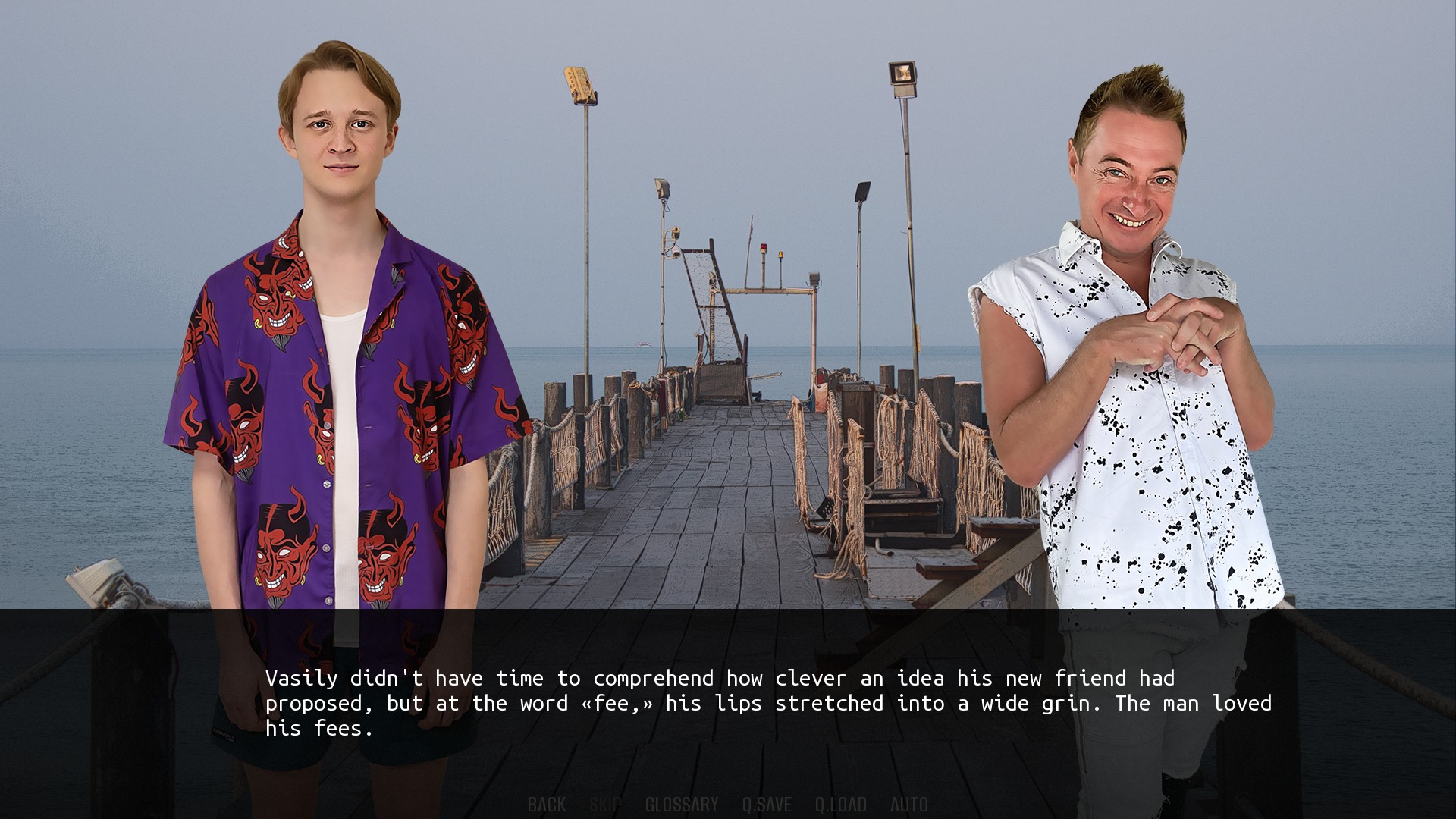
Glossary:
Given that there are quite a few terms in the novel that require clarification (which inevitably causes pacing issues), I decided to implement a thesaurus for all the words that might be unfamiliar to a reader who is not well-versed in Thai culture. It turned out to be a great idea because it gave the readers a choice to either skip the details or satisfy their curiosity. Be it eating giant bugs or phallic symbols as a means of summoning rain and fighting evil spirits, every cultural phenomenon has gotten its rightful entry into the Glossary. By the way, the drink known as Red Bull was invented by a Thai, and the Austrian guy simply "borrowed" the idea. There are some additional entries in the English version that shed light on the cultural phenomena only Russian-speaking people know of. Like, why Russian citizens call each other black and what hawthorn tincture is.
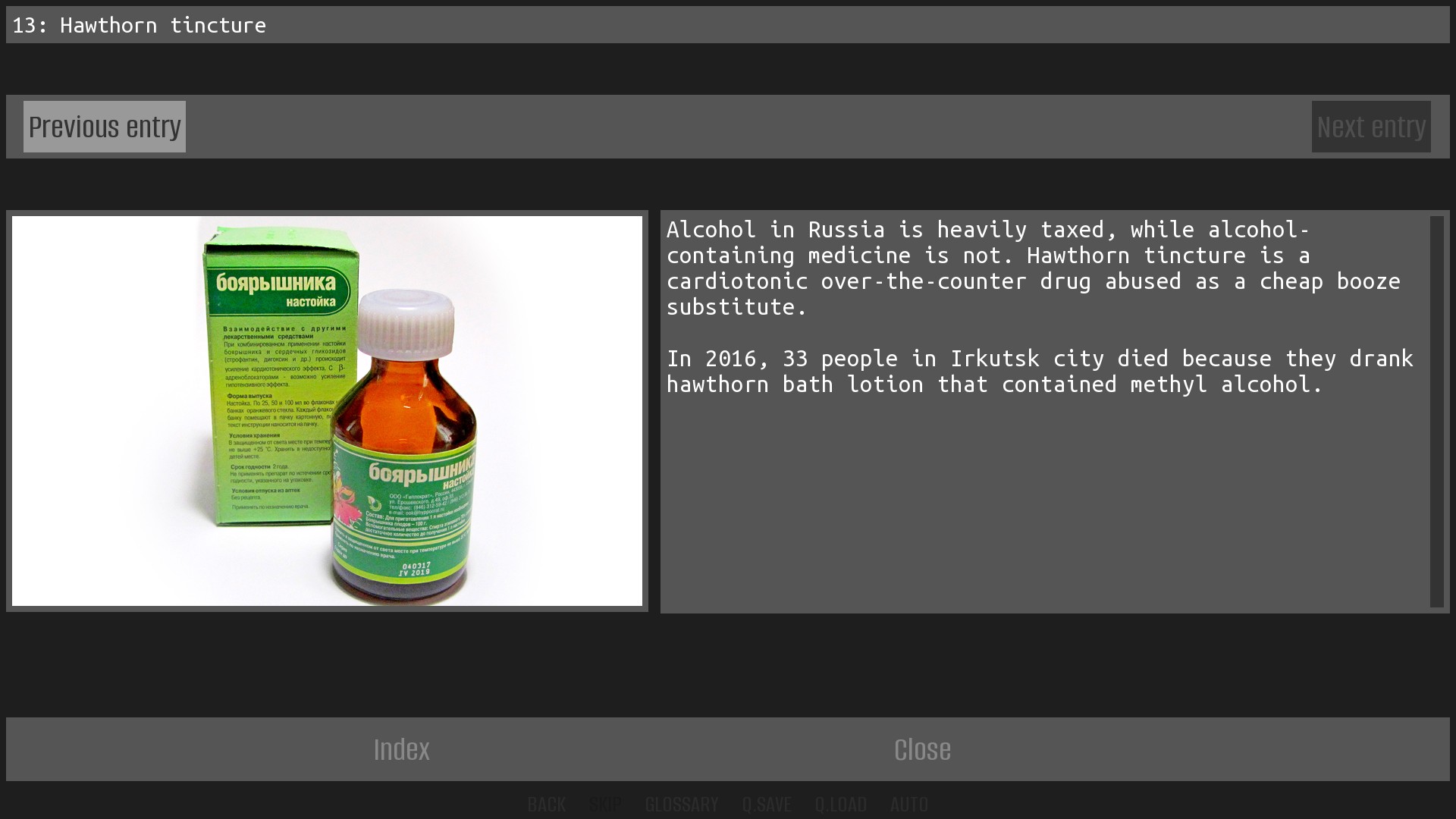
Afterword:
Finally, I'd like to whine a little about the fact that Thai folklore, in all its diversity, is not known to the general public. The only somewhat popular video game out there is Home Sweet Home. There's also The Medium, a folk-horror movie. I can safely recommend them both.
As for my visual novels, they were fun to work on, so I don't regret spending nearly three years of my free time. Indie novels, especially those using edited photos instead of hand-drawn art, are not popular even among the fans of the genre, but I believe that niche novels are valuable, if only because their creators are not afraid to do their own thing. They persevere despite the lack of demand and the outright shaming and name-calling that inevitably accompanies authors in the Russian-speaking part of the Internet. Not that the English-speaking communities welcome them with open arms: although it isn't customary to badmouth indie visual novels (thank you so much!), most of them are merely ignored.
Nevertheless, I did my best to fill my own work with everything I myself enjoy in books, movies, and games: a twisted plot, absurdism, hard-hitting humor, eccentric characters, and actual events intertwined with fictional ones into complex and, therefore, even more compelling stories.
No Men in This House was released on Steam on November 5th, 2022, and my stay in Thailand ended two weeks after that. There probably won't be any more Thai novels, but I hope there will be others just as strange, totally free, written to tell people about the culture and folk beliefs of the countries I lived in.
Files
Get No men in this house
No men in this house
Not your typical visual novel
| Status | Released |
| Author | Anastasia Erokhina |
| Genre | Visual Novel |
| Tags | Atmospheric, Detective, Folklore, Indie, Mystery, Narrative, Story Rich |
| Languages | English, Russian |
| Accessibility | Subtitles, One button |

Leave a comment
Log in with itch.io to leave a comment.